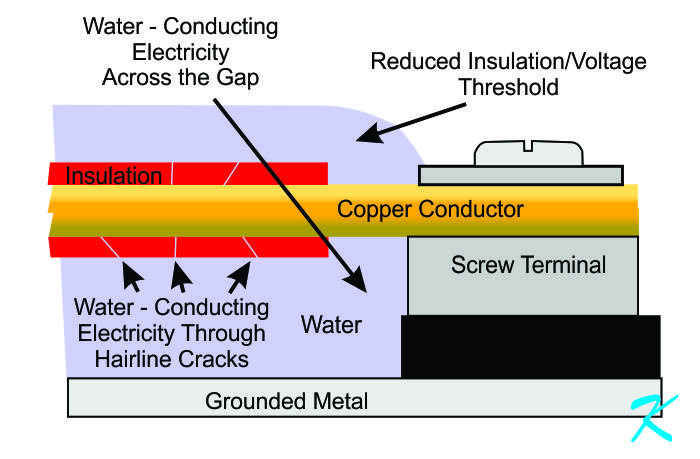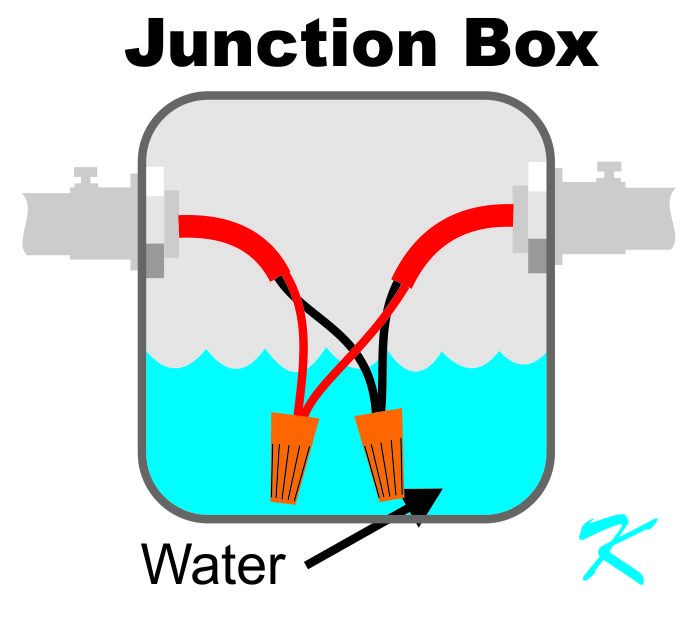Water
Water conducts electricity. Water, though, is not like a copper conductor, which conducts electricity at very low resistance, no matter what voltage is applied. Water conducts very poorly at less than, say, 5 volts, but conducts a lot better at higher voltages of, say, more than 9 volts. If the voltage is even higher, say 13 volts, water conducts even better.
It's a non-linear conductor, it conducts better at higher voltages than at lower voltages.
The purity of the water also makes a difference, rain water conducts much better than distilled water (distilled water removes almost all impurities).
Water-Based Ground Faults
Several times, I opened up a junction box, and water flowed out. When I do that, I turn to the maintenance person that was following me around, and say "I think I found your problem". Water can, and often does cause ground faults.

Most wire used for fire alarm systems has microscopic cracks in the insulation. Sometimes, the insulation came originally without the cracks, but because the insulation is meant to be installed inside of buildings where water does not normally reach the insulation, over time, the microscopic cracks appear.
Water isn't supposed to be inside a building, but if water is present, water gets into cracks in the insulation and conducts electricity. Water present where it doesn't belong is one cause of ground faults.
I've seen it where just water condensing on the side of a switch bridges the gap between a screw terminal and building ground.
Ohmmeter
Your ohmmeter has a battery inside it. I don't know the voltage of your battery, but it could be as low as 1.5 volts, or as high as 9 volts. If the battery inside the ohmmeter is 1.5 volts or 3 volts, the ohmmeter will not detect a water-based ground fault.
If the battery is 9 volts, often an unsteady, very high resistance reading will show on the ohmmeter. This unsteady high resistance reading takes some interpretation by the technician, but with a little practice, this high resistance can often be used.
The fire alarm panel, though, is a better meter than the 9-volt ohmmeter. If the fire alarm panel is a 24-volt (nominal) panel, it will be using a minimum of 13.5 volts in its ground fault detection circuit.
When looking for water-based ground fault, your ohmmeter is an unreliable ground fault detector. With a water-based ground fault, if the panel says there's a ground fault, there usually is a ground fault.
Addressable Systems
Sometimes, with an addressable system, there's a shortcut to finding the ground fault. If there's a ground fault trouble on an addressable device, go to the addressable device, and start looking for the ground fault from there. Any addressable device that shows a ground fault is saying "There's a ground faut on my input or on my output".
Because it's an addressable device, the ground fault being shown is not on the Signaling Line Circuit (SLC). The ground fault is on the device side of the addressable module.
Some words of caution, though. The panel listens to the data from the addressable modules. When a module tells the panel that there's a ground fault, the panel will display that there's a ground fault on the module until the module says that the ground fault is gone. Even after the ground fault is fixed, if the SLC is disconnected, the module can't tell the panel that the ground fault is fixed, the panel will still show a ground fault on the module. Reconnect the SLC before checking the panel to see if the ground fault is fixed.
Soft Ground Fault
A soft ground fault is similar to a normal ground fault. Usually, the normal ground fault is a hard connection to the building ground, like a copper conductor leaning against a conduit. Water, though, isn't a hard connection, it's a soft, non-linear, electrical conducting bridge to building ground. A water-based ground fault, or soft ground fault, does not induce electricity from another system into the fire alarm system.
Can Water Cause a Ground Fault?
Yes, water conducts electricity, so can easily cause a ground fault. I've had to fix many water-based, soft ground faults over the years.
Douglas Krantz

